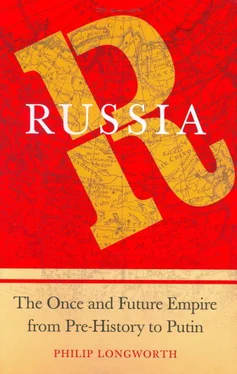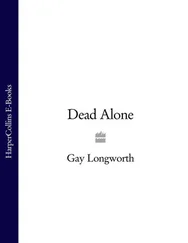As they moved north to the Baltic and east to the foothills of the Urals, the east Slavs, including the proto-Russians, were not alone in the wilderness they were reclaiming. They had encountered people speaking Finno-Ugrian dialect in the north, and to the south and south-east they were to encounter peoples who had originated in the Caucasus and in the steppes of Asia. Traces of these contacts are seen in traded objects found by archaeologists, in physical (especially facial) characteristics recorded by physical anthropologists, and in singularities of language studied by philologists.
Yet barriers of ice and wetland continued to impede settlement long after the global warming got under way. The ‘Black Earth’ belt of rich, loamy soil which made Ukraine the breadbasket of Russia — and for a time around 1900 of Europe too — extends from the margin of European Russia, the core of the original Russia, into the Urals and western Siberia. But the quality of arable land in the rest of the country is inferior, and most of the land mass is not cultivable at all. Marshes and bogs still preclude agriculture over large areas, though some were drained in the Soviet period; and until relatively modern times, seemingly dense forest impeded development.
And always the Russian climate has been unstable, largely unpredictable. It has been a major influence on Russians, and made them unlike other peoples. Severe though the North American climate can be, Russia’s is worse. Even the south is cold — colder than central Europe. Summers there may be mild, even hot, but, as Baedeker warned, ‘Sudden variations in temperature are very frequent… The traveller must always be on his guard against sudden falls in temperatures.’ 12Climate variations can cause havoc, and have often done so in Russia. On the North American prairies one expects snow to fall before the ground freezes, which insulates autumn-sown crops. But on the Russian steppes severe ground frosts not infrequently precede snow falls, in which case the seed freezes — and until a few decades ago that could spell famine. As for rainfall, it is adequate in the north, where soils are poor, but poorer where the soil is good. And not only does the climate tend to extremes: so do the seasons. Winters are long and dark, summers hot but short, and in the north it remains light throughout the month of May.
In the west of Europe spring comes in March and farmers can continue working the fields into December. In Russia, by contrast, it is still as if the Ice Age has not quite concluded: the growing season lasts barely five months rather than eight or more. Moreover, to produce enough for subsistence the poor soil demands more labour than in, say, France or North America south of the 52nd Parallel. These conditions were to have huge implications for the way in which both Russia and the Russians developed. They influenced the Russian temperament, and even the nature of Russian institutions.
For example, the very short growing season made for haste in both sowing and reaping. This encouraged interdependence between farmers to get things done, and even a tendency to share resources. But it also discouraged farming on an individual basis. Individualism involved risk; co-operation was a form of insurance. Russians may not have been natural communists, as romantic socialists used to claim, but the landscape and the harsh environment from which they have had to wrest a living seem to have developed in them a capacity for suffering, a certain communalism, even a willingness to sacrifice the individual for the common good. Circumstances made it impossible for the Russian economy and the Russian state to develop as England, France or, in due time, the United States were to develop.
The pressure to prepare the soil for spring sowing as soon as the ground was safe from frost, and to harvest all one’s crops before the rains came, required frenetic, strenuous effort, long hours in the field, and the mobilization of children. On the other hand in winter, when days were short and there was little work to do outdoors, and little indoors either apart from whittling wood, Russians tended to indolence and lethargy. In short, temperamentally they inclined to extremes — or at least the men did. The demands on women were different. Not only were the domestic chores left to them, so too was the care of the homestead’s domesticated animals — and cows and goats, of course, not to mention children, need attention on a daily basis. Such tasks induced a different approach to work, a different temper.
As Professor L. Milev of Moscow University has argued, the low level of surplus encouraged the emerging elite to control wider areas and ever more farmers, in order to increase their income. This helps to explain the tendency of the Russian state to expand, or so it has been claimed. Moreover the fact that farmers had little incentive to work harder to produce a surplus without compulsion, or the threat of it, was at the root of the violent tendency in Russian life, the autocratic nature of Russian governments. 13But there was another source of Russian violence, deriving from defence needs. At first the northern forest zone had been too thinly peopled to promote much competition between groups of settlers. Nor had there been much risk of attack by outsiders in the zone of wooded steppe to the south in the area of modern Ukraine, around the upper and middle reaches of the river Dnieper and its tributaries, which was the region of densest proto-Russian settlement 3,000 years ago. But the open steppe further to the south could be dangerous. This was where groups of nomads — incomers from the Caucasus and Central Asia — grazed their horses and their herds. Their interests were different from those of the agricultural settlers. Not only did they chase would-be colonizers of the open steppe off their grazing lands, they encroached on their areas of settlement.
The first such nomadic group we know of arrived about 1000 BCE. These were the Cimmerians, who figure in the Odyssey and who are described by the Greek historians Herodotus and Strabo. The Cimmerians spoke an Iranian language; they swept over the whole region, from the northern Caucasus to the Carpathians, and extended their conquests into Thrace and Asia Minor. King Midas of Phrygia was evidently one of their victims. Archaeologists have concluded that for four centuries, until about 600 BCE, the agriculturalists in Ukraine traded food for Cimmerian copper and bronze goods, but otherwise kept themselves at a respectful distance. 14
The Cimmerians fell victims to another aggressive people from Asia: the Scythians. The Scythians ranged even further afield than the Cimmerians had done, becoming a menace in the Middle East as far away as Egypt. They were to brush with both Darius and Alexander the Great, and with Mithridates, king of Pontus, and they were to influence the Slavs of what is now Ukraine. Archaeologists tell us that the Scythians were warlike, loved horses, imported goods from the ancient Greeks, and employed Slavs who provided them with food. These, presumably, are the Scythian husbandmen to whom Herodotus refers to in his Book 4. 15Later still the Sarmatians arrived, and both they and the Scythians left a mark on the imagination of the Slavs. Some latter-day Russians thought that the Scythians represented the quintessence of their supposedly Asian heritage, and the Polish gentry of the seventeenth century imagined the Sarmatians to personify the noble class, and even claimed to be descended from them.
As we shall see, other predatory peoples were to storm into the area from Asia later, but we may suppose that the Cimmerians’ occupation of the open steppe stimulated agriculture in the forest steppe just to the north. Certainly it was on the forest steppe that plough technology, as well as a fallow system of land use, was developed — rather than in the forest zone or the open steppe. More than one kind of implement was devised. Some were fitted with iron parts which could cut through the tangled root systems in the comparatively shallow soils which predominated in the cultivable areas north of the Black Earth zone. The black earth itself is among the most productive soils on the planet and, once tamed for cultivation, promotes fast population growth and social development. However, the land there was heavy to work, and called for something more effective than a human-powered scratch-plough, which would have to be pushed over a field not once but several times. The more effective ploughs had the disadvantage of being heavier and difficult to propel, although in time ways were to be found to harness oxen or horses to pull them. 16
Читать дальше





![Stephan Orth - Behind Putin's Curtain - Friendships and Misadventures Inside Russia [aka Couchsurfing in Russia]](/books/415210/stephan-orth-behind-putin-s-curtain-friendships-a-thumb.webp)





